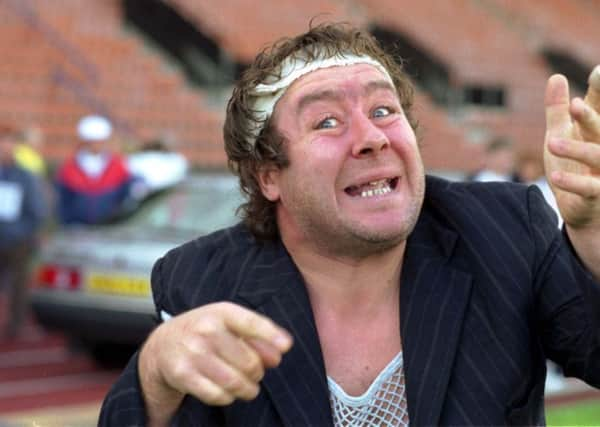The scandal of athletes honed by booze, vaping and gambling – Jane Bradley


We were watching TV one evening when an advert came on. It pictured athletes Vanessa Wallace and Laura Sugar taking a break from training to indulge in a tasty snack.
“Muller Crunch Corner, the official yoghurt of British Athletics,” the voiceover proclaimed – failing to mention, somewhat unsurprisingly, that the dessert contains a whopping 17.7 grams of sugar.
Advertisement
Hide AdAdvertisement
Hide Ad“An official yoghurt?” my husband muttered. “Why does athletics need a yoghurt?” And he’s right – it is incredibly contrived.
Of course, I am being glib. Obviously athletics doesn’t need a yoghurt, but athletes do need money to be able to train – so why shouldn’t they be paid by a yoghurt brand?
There are, without doubt, worse ways for athletes to pay for their sport and many teams still choose to follow the money. Indeed, up until 2003, a follow-on from the when the Tobacco Advertising and Promotion Act banned tobacco advertising in and around sport, sports teams and individuals promoted cigarette companies.
It is almost impossible to imagine such a thing today, in a new era when even the packets of cigarettes are not allowed to display a name or advertising logo. Those who do not smoke will barely be familiar with the likes of Embassy (which in my 1980s childhood mind is synonymous with snooker) or remember Formula One cars whizzing around the track with the red Marlborough branding.
Yet, while it has been more than 15 years since we banned tobacco advertising in sport, we have been slow to catch on with other so-called “vice” industries. Week in, week out, sports fans, young and old, are the marketing targets of companies pushing alcohol, e-cigarettes and gambling.
Scottish Women’s Football is leading the way in cleaning up sport sponsorship, by saying that it will never accept sponsorship from alcohol or gambling companies, with chair Vivienne McLaren saying she wants fans of the game to have “a cleaner view of life”. Hallelujah.
Yet other teams seem unable to stay away from controversial companies. Football team Hibernian recently announced a tie-up with Edinburgh-based vaping firm VPZ, while Diageo is desperate to promote the news that its Guinness brand has started sponsoring women’s rugby – as well as the men’s teams.
Health organisations express worry over the vaping sponsorship due to the fact that, although the device is useful for smokers trying to give up, the health risks are as yet largely unknown – and by sponsoring a sports team, it could be seen as marketing to both non-smokers and children. The Scottish Government’s official position on electronic cigarettes is they need “to be controlled carefully”, yet, there we are – willy-nilly allowing them to advertise to one of the biggest and most captive demographics in the country. This was the last nail in the vice coffin for Hibs, which, with the addition of VPZ, has gone for the triple whammy, with existing sponsorship deals with alcohol company Eden Mill and betting firm Marathonbet.
Advertisement
Hide AdAdvertisement
Hide AdScottish footballer Kevin Twaddle, who battled a crippling gambling addiction which saw him sink £1 million into his habit, has regularly spoken out against the gamne’s tie-up with bookie William Hill, which sponsors the Scottish Cup. And he is not the only one.
Yet almost every time footballers play a match, they are bombarded with images, slogans and logos advertising the very places which those attempting to recover from the addiction are trying to avoid.
Earlier this week, Guinness’s marketing team tried to pitch this season’s sponsorship to me as “great news”, which in some ways it is: it tackles gender issues in the sport, they say – with the same product sponsoring both the men’s and women’s teams.
They will brand stadiums and player changing rooms, including at Scotstoun Stadium in Glasgow. But while I’m glad that men and women are being treated equally, the idea that the branding of elite athletes – who consider every tiny morsel that they put into their bodies – should be synonymous with alcohol or, indeed, junk food does not sit well with me.
I have argued on these pages before that stocking vending machines full of unhealthy drinks and snacks does not set a good example for children coming out of sports classes – I still have a weekly battle with my daughter at our local leisure centre about not snacking on crisps and juice after her gymnastics session. There are some changes on the cards for the industry, but they are happening fairly slowly. Coca-Cola recently promised to use its sponsorship of English soccer’s Premier League to highlight some of the healthier beverages in its portfolio rather than its iconic Coke brand. It’s undoubtedly a start. But we need to do more.
Scotland needs to shake off its “sick man” image to clean up its sports sponsorship – with the shining beacon of women’s football leading the way.
